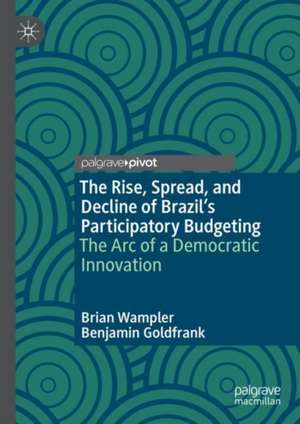The Rise, Spread, and Decline of Brazil’s Participatory Budgeting: The Arc of a Democratic Innovation
Autor Brian Wampler, Benjamin Goldfranken Limba Engleză Hardback – 4 ian 2022
Preț: 361.47 lei
Preț vechi: 435.51 lei
-17% Nou
Puncte Express: 542
Preț estimativ în valută:
69.20€ • 72.20$ • 58.01£
69.20€ • 72.20$ • 58.01£
Carte disponibilă
Livrare economică 19 februarie-05 martie
Livrare express 05-11 februarie pentru 26.41 lei
Preluare comenzi: 021 569.72.76
Specificații
ISBN-13: 9783030900571
ISBN-10: 3030900576
Pagini: 127
Ilustrații: XIII, 132 p. 2 illus. in color.
Dimensiuni: 148 x 210 x 16 mm
Greutate: 0.33 kg
Ediția:1st ed. 2022
Editura: Springer International Publishing
Colecția Palgrave Macmillan
Locul publicării:Cham, Switzerland
ISBN-10: 3030900576
Pagini: 127
Ilustrații: XIII, 132 p. 2 illus. in color.
Dimensiuni: 148 x 210 x 16 mm
Greutate: 0.33 kg
Ediția:1st ed. 2022
Editura: Springer International Publishing
Colecția Palgrave Macmillan
Locul publicării:Cham, Switzerland
Cuprins
Chapter 1: Introduction.- Chapter 2: Analytical Framework: Internal, Horizontal, Vertical.- Chapter 3: Creation: Workers’ Party Governments and Civil Society Allies.- Chapter 4: The Spread of PB: The Workers’ Party and Beyond.- Chapter 5: Outcomes: When and Where Did PB Live Up to the Hype?.- Chapter 6: The Slow Decline of PB from 2005 to 2020.- Chapter 7: Conclusion.
Notă biografică
Brian Wampler is Professor of Political Science at Boise State University, USA.
Benjamin Goldfrank is Professor at the School of Diplomacy and International Relations at Seton Hall University, USA.
Textul de pe ultima copertă
"Why is participatory budgeting spreading internationally and at the same time is being abandoned in Brazil, its birthplace? Wampler and Goldfrank answer this question by providing a detailed analysis of the history of this democratic innovation, and the reasons for this decline. This is an important book that will generate vibrant discussions among all those interested in participatory democracy."
Daniel Schugurensky, Professor, School of Public Affairs and School of Social Transformation, Arizona State University
“With this excellent book, Goldfrank and Wampler make a compelling argument to conceptualize participatory institutions as inherently political. In a major contribution to the literature, they provide an innovative and empirically-grounded theory to explain why and how Brazil’s flagship participatory budgeting (PB) institutions started to decline after a period of intense diffusion in the 2000s. As PB continues its progression (and transformation) around the world, this is a particularly timely contribution and a must read for scholars, policy makers and students interested in democratic institutions, in general, and in the politics of participatory innovation, in particular.”
Françoise Montambeault, Associate Professor, University of MontrealThis book examines the rise, spread and decline of participatory budgeting in Brazil. In the last decade of the twentieth century Brazil became a model of participatory democracy for activists, practitioners, and scholars. However, some thirty years later participatory budgeting is in steep decline, and on the verge of disappearing from Brazil. Drawing from institutional, political choice, civil society, and public administration literature, this book generates theory that accounts for the rise and fall of an innovative democratic institution. It examines what the arc of the creation, spread, and decline of participatory budgeting tells us about the long-term viability and potential democratic impact of this innovative democratic institution as it spreads globally. Will the same inverted trajectory plague other countries in the future, or will they be able to sustain participatory budgeting for greater periods of time?
Brian Wampler is Professor of Political Science at Boise State University, USA.
Benjamin Goldfrank is Professor at the School of Diplomacy and International Relations at Seton Hall University, USA.
Caracteristici
Examines the rise, spread and decline of Brazil’s participatory budgeting Draws from institutional, political choice, civil society, and public administration literature Considers what the decline of participatory budgeting in Brazil means for other nations
